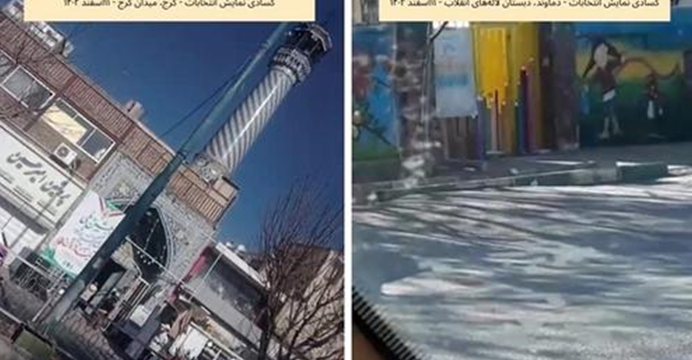

Despite repeated calls from the country’s leaders, including Ayatollah Khamenei, urging citizens to participate, the response has been far from satisfactory. Reports pouring in from the PMOI Social Headquarters, eyewitnesses, and journalists depict a Tehran with significantly lower turnout compared to the 2020 elections.
Troubling statistics emerge from various polling stations, especially in Bandar Abbas and cities across Khuzestan, such as Ahvaz, Behbahan, Dezful, and Bagh Malek. Shockingly, even with allegations of fraud lingering, over 90% of the ballots remain untouched by 4 pm, signaling a turnout far below the levels witnessed in the 2020 elections. In districts like Varamin, Qarchak, and Pishva, election officials report a meager 7% ballot usage by 3 pm.
The regime’s Radio and TV reporter, attempting to prepare a report on the ground, was forced to return empty-handed, underscoring the widespread apathy towards the electoral process.

Meanwhile, reports of vote buying and selling echo from various corners of the country, including Khorramabad, Arak, Bandar Anzali, Ramsar, Lahijan, and Mahshahr. These transactions occur at prices ranging from 5 to 25 million rials. Amidst internal conflicts within the regime’s factions, the prosecutor of Marvdasht announces the arrest of an individual caught red-handed with 2 billion rials, implicated in the illicit trade of votes.
In a bid to manipulate votes further, the regime’s election headquarters announces that illiterate or disabled individuals can bring literate family members or trusted persons to cast their votes on their behalf. Simultaneously, accusations surface against perceived adversaries, with claims that the PMOI, along with external forces, is orchestrating a boycott to thwart public participation.
The authorities intensify their crackdown on dissenting voices, as the Cyber Center of the Intelligence Organization of the State Security Force of the Razavi Khorasan identifies and deals with 11 Instagram pages allegedly fomenting anti-regime sentiment and election boycotts. This move follows the recent arrest of numerous individuals who dared to call for a boycott of the elections, marking a troubling backdrop to Iran’s electoral landscape.

MEK Iran (follow us on Twitter and Facebook), Maryam Rajavi’s on her site, Twitter & Facebook, NCRI (Twitter & Facebook), and People’s Mojahedin Organization of Iran – MEK IRAN – YouTu







